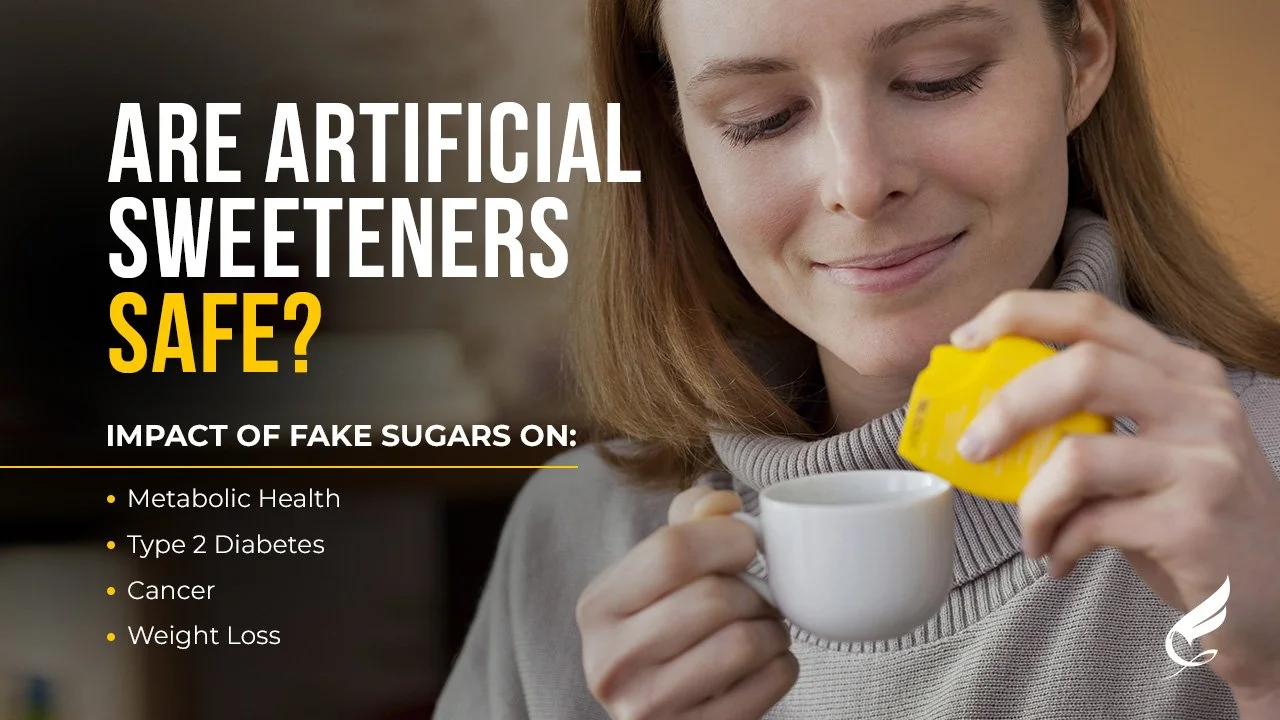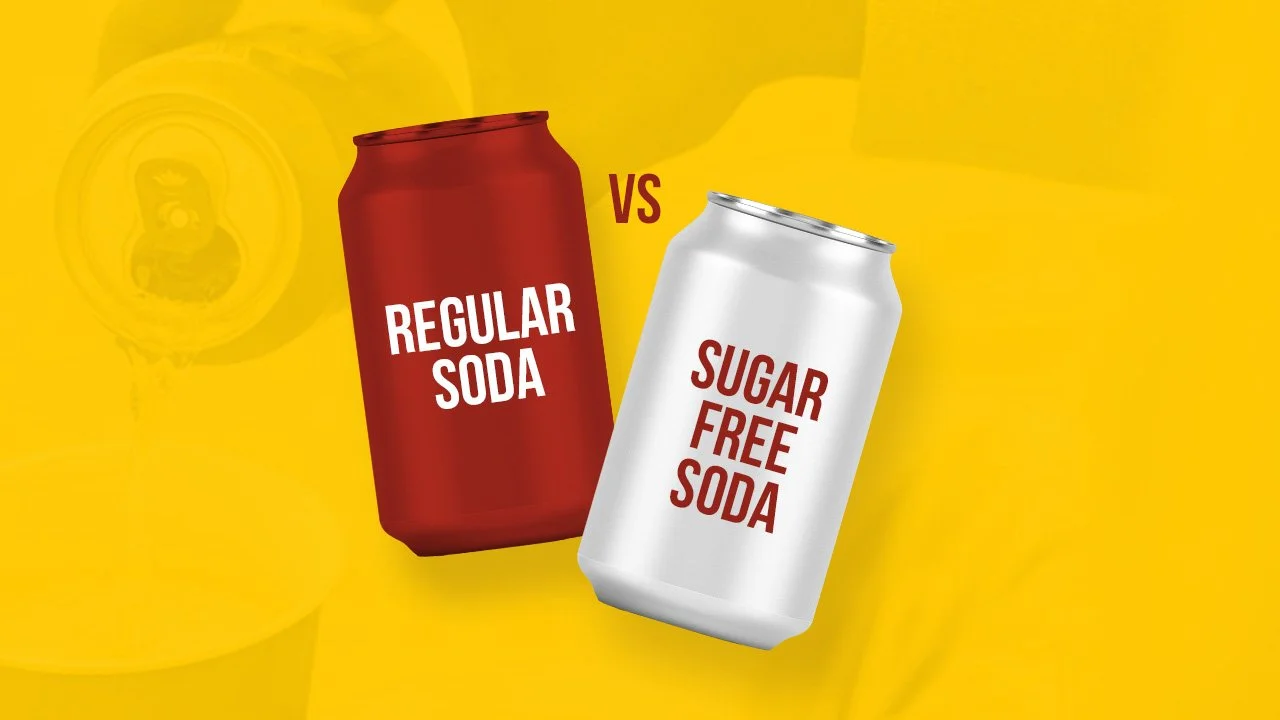Artificial Sweeteners: Separating Fact from Fiction
Artificial sweeteners are everywhere, from diet sodas to sugar-free desserts. But are they safe? Do they really help with weight loss? Or could they harm our health? This comprehensive guide will explore the latest research on artificial sweeteners, their potential benefits and risks, and how they impact metabolic health, diabetes, cancer, and weight management. We'll also address common questions and concerns, providing the information you need to make informed choices about your diet and lifestyle.
Decoding Artificial Sweeteners: What Are They and Are They Safe?
Artificial sweeteners, also known as non-nutritive sweeteners, are synthetic or natural substitutes for sugar. They offer the sweetness of sugar without the calories, making them a popular choice for those watching their weight or managing conditions like diabetes.
Common artificial sweeteners include:
Saccharin
Aspartame
Sucralose
Neotame
Acesulfame potassium (Ace-K)
These sweeteners are found in a wide range of products, from diet sodas and sugar-free gum to yogurt and even some "healthy" snacks. They're also available in packets for convenient use in coffee, tea, or other beverages.
The Safety Debate: Are Artificial Sweeteners Truly Safe?
While the fitness and nutrition community believes that daily consumption of artificial sweeteners is perfectly safe, it is essential to examine this claim and consider the available scientific evidence critically. Rest assured, we'll provide you with a comprehensive overview of the safety of these sweeteners.
While a large body of research suggests that artificial sweeteners are generally safe when consumed in moderation, some studies have raised concerns about their potential long-term health effects. We'll delve into these concerns and explore the latest research in the following sections.
Sucralose: A Closer Look at Its Safety
A 2017 comprehensive review published in the Journal of Food and Chemical Toxicology examined numerous studies on sucralose involving rats, dogs, and humans. The review concluded that sucralose is safe for general use as a sweetener in food products.
However, it's also important to consider other research and artificial sweeteners.
The Nutri Sante Study and Cancer Risk
A more recent study, the Nutri Sante Population-Based Cohort Study, published in March 2022, investigated the link between artificial sweeteners and cancer risk. This large-scale study involving over 100,000 French adults found an association between artificial sweeteners (particularly acesulfame-K and aspartame) and an increased risk of cancer.
FDA's Stance on Sucralose
The Food and Drug Administration (FDA) has established an Acceptable Daily Intake (ADI) for sucralose, deeming it safe to consume up to 15 mg per kilogram of body weight daily. To put this in perspective, a 70 kg person could safely consume about 12 packets of Splenda per day.
Understanding ADI (Acceptable Daily Intake)
It represents the amount of a specific substance that can be consumed daily over a lifetime without any anticipated adverse health effects.
Aspartame: Navigating the Controversy
Aspartame, a widely used artificial sweetener, has been the subject of much debate and controversy regarding its safety. While some studies have raised concerns about potential health risks, others have found no significant adverse effects.
Conflicting Evidence:
Animal Studies: A 2021 study on rodents linked aspartame consumption to an increased cancer risk. However, this study has faced criticism from the scientific community, with some suggesting potential methodological flaws or biases.
Human Studies: A large-scale 2006 study on humans found no association between aspartame intake and certain types of cancer. This study provides some reassurance regarding aspartame's safety in humans.
FDA's Perspective:
The FDA has set the Acceptable Daily Intake (ADI) for aspartame at 50 mg/kg body weight, indicating it's safe to consume within this limit. For a 70 kg person, this translates to roughly 40 packets of Equal per day.
The Bottom Line:
The research on aspartame's safety is mixed, with some studies suggesting potential risks and others finding no significant harm. As with any artificial sweetener, moderation is key. It's wise to be mindful of your aspartame intake and stay informed about the latest research in this area.
Metabolic Syndrome and Type 2 Diabetes: The Hidden Risks
While artificial sweeteners are often marketed as a healthy alternative to sugar, research suggests a potential link between their consumption and an increased risk of metabolic syndrome and type 2 diabetes.
The Multiethnic Study of Atherosclerosis found that daily consumption of diet drinks was associated with a 36% increase in metabolic risk and a staggering 67% increase in the risk of developing type 2 diabetes. These findings challenge the common belief that artificial sweeteners are a harmless way to manage weight and prevent metabolic diseases.
It's essential to be critical of claims made by "health gurus" and consider the scientific evidence before making dietary decisions. While artificial sweeteners seem like a guilt-free way to satisfy your sweet tooth, their long-term impact on metabolic health warrants careful consideration.
Artificial Sweeteners and Weight Loss: The Complex Reality
The relationship between artificial sweeteners and weight loss is a subject of ongoing debate. While some studies suggest a potential for modest weight reduction, others find no significant impact. The truth is, it's not a simple yes-or-no answer.
Research Findings:
A 2017 meta-analysis indicated that non-nutritive sweeteners (NNSs) might slightly reduce body weight compared to control groups.
However, a more recent 2020 study found no clear evidence that NNSs lead to weight loss or reduced fat mass in adults.
The Bigger Picture:
Artificial sweeteners might play a role in weight management, but they're not a magic solution. Many other factors, such as overall diet quality, exercise habits, and individual metabolism, significantly impact weight loss success.
The Impact of Artificial Sweeteners on Weight Loss: Examining the Evidence
While artificial sweeteners are calorie-free, their impact on weight loss is more complex than it seems. Research presents a mixed picture, with some studies suggesting potential benefits and others raising concerns.
The Zero-Calorie Paradox
While artificial sweeteners themselves are calorie-free and thus can't directly cause weight gain, they may indirectly influence weight management. This influence is primarily through their effects on appetite, cravings, and metabolism. Some studies have noted a correlation between artificial sweetener consumption and increased body weight, suggesting a potential link.
Research Findings: A Closer Look
Observational Studies: Several large-scale studies have found associations between artificial sweetener use and weight gain or elevated BMI, particularly in children and adolescents.
Interventional Studies: Multiple controlled trials suggest that artificial sweeteners do not lead to significant weight loss when used alone.
Appetite and Cravings: Experiments have shown that artificial sweeteners can stimulate appetite and increase cravings for sweet foods, potentially leading to overeating.
The Bottom Line:
It's important to remember that artificial sweeteners are not a magic bullet for weight loss. While they can help reduce calorie intake, their potential impact on appetite and cravings could hinder progress. Therefore, it's crucial to focus on a balanced diet, regular exercise, and mindful eating habits for sustainable weight management.
Artificial Sweeteners: The Deception of Intense Sweetness
Artificial sweeteners, with their intense sweetness that often surpasses table sugar by hundreds of times, are a double-edged sword. While they may seem like a boon for those looking to cut down on sugar, it's crucial to be aware of the potential pitfalls.
The intense sweetness of artificial sweeteners can:
Reinforce Sugar Cravings: Constantly exposing your taste buds to highly concentrated sweetness might inadvertently increase your cravings for sugary foods.
Promote Sugar Dependence: The intense sweetness can create a reliance on artificial sweeteners, making it difficult to enjoy the natural flavors of whole foods.
Lead to Addiction: Repeated exposure to delightful substances can trigger addictive pathways in the brain, potentially leading to overconsumption of processed foods and drinks.
While enjoying a diet soda occasionally is perfectly fine, daily consumption might reinforce these addictive behaviors and hinder your weight loss efforts.
Remember: The key to successful weight loss is avoiding certain foods and embracing a balanced diet, regular exercise, and mindful eating habits. Artificial sweeteners can be a useful tool in moderation, but they should not be seen as a shortcut to weight management.
The Diet Soda Dilemma: Are They Truly a Healthier Choice?
Many people turn to artificially sweetened beverages like diet sodas as a seemingly healthier alternative to sugary drinks. But are they truly better for you?
The short answer is not necessarily. While diet sodas might be lower in calories, they still don't offer any nutritional value and can contribute to unhealthy habits. Both artificially sweetened and sugary drinks can be highly addictive and trigger cravings, potentially leading to overconsumption of other foods and hindering weight loss efforts.
My Recommendation:
Instead of relying on either diet sodas or sugary drinks, prioritize healthier beverage options like:
Water
Herbal tea
Freshly squeezed juices (in moderation)
Smoothies made with whole fruits and vegetables
Defining "Safe": The Gray Area of Artificial Sweeteners
The safety of artificial sweeteners is a complex issue. While the FDA has generally deemed them safe within recommended daily limits, it's important to remember that long-term studies on their effects are limited. Some research suggests potential links between high consumption of artificial sweeteners and various health concerns.
Therefore, "safe" is subjective and depends on your risk tolerance and health goals. If you're concerned about the potential long-term effects of artificial sweeteners, it's best to limit your intake and prioritize whole, unprocessed foods.
Artificial Sweeteners: A Balanced Perspective
Artificial sweeteners have become ubiquitous in our modern diets, offering a seemingly guilt-free way to satisfy our sweet tooth. However, the research on their long-term health effects and impact on weight management remains inconclusive.
While some studies suggest potential benefits in terms of calorie reduction, others raise concerns about their influence on appetite, cravings, and metabolic health. The key takeaway is that artificial sweeteners are not a magic solution for weight loss.
Prioritize Whole Foods and Mindful Choices
For sustainable health and weight management, the key is to focus on building a balanced diet centered around whole, unprocessed foods. This emphasis on whole foods should reassure you and give you confidence in your dietary choices. Use artificial sweeteners sparingly and mindfully, and stay informed about the latest research in this evolving field.
Need Expert Guidance on Nutrition and Weight Loss in Dubai?
At Fortius Dubai, we're passionate about empowering you to make informed choices about your health and fitness. Our team of experts can provide personalized guidance and support whether you're looking to optimize your nutrition, achieve your weight loss goals, or enhance your overall well-being.
Take the Next Step:
Explore our blog for more in-depth nutrition, fitness, and wellness articles.
Contact us today for a free consultation and discover how we can help you achieve your best self.
Stay Strong #BeFortius







